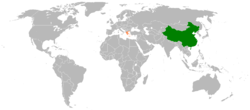China–Greece relations
 | |
China |
Greece |
|---|---|
Chinese-Greek relations are the relations between the People's Republic of China and the Hellenic Republic. China has an embassy in Athens. Greece has an embassy in Beijing and 3 general consulates in Guangzhou, Hong-Kong and since 2005 in Shanghai. The Port of Piraeus is important from a geostrategic view for China, as it helps China's transactions with the whole of Europe. Thousands of Chinese people are living in Greece inside the Overseas Chinese context.
History of bilateral relations
Ancient
Following the ancient Roman embassies to China recorded in ancient Chinese histories, there appear to have been contacts between the Byzantine Empire and several dynasties of China, beginning with the Tang Dynasty (618-907 AD).[1] From Chinese records it is known that Michael VII Doukas (Mie li sha ling kai sa 滅力沙靈改撒) of Fu lin (拂菻; i.e. Byzantium) dispatched a diplomatic mission to China that eventually arrived in 1081, during the reign of Emperor Shenzong of the Song dynasty (960-1279 AD).[2] Kublai Khan, the Mongol-ruler who founded the Yuan dynasty (1271-1368 AD) of China not only maintained correspondence with the Byzantine Greeks but hosted some of them at his court in Khanbaliq (modern Beijing). The History of Yuan (chapter 134) records that a certain Ai-sie (transliteration of either Joshua or Joseph) from the country of Fu lin (i.e. the Byzantine Empire), initially in the service of Güyük Khan, was well-versed in Western languages and had expertise in the fields of Greek medicine and astronomy that convinced Kublai Khan to offer him a position as the director of medical and astronomical boards.[3] Kublai Khan eventually honored Ai-sie with the noble title of Prince of Fu lin (Chinese: 拂菻王; Fú lǐn wáng).[3] In his biography within the History of Yuan his children are mentioned by their Chinese names, which bear similarities to the Christian names Elias (Ye-li-ah), Luke (Lu-ko), and Antony (An-tun), with a daughter named A-na-si-sz.[3]
Modern
During the Korean War the two countries were enemies and their forces fought each other.
Establishment of relations
In 1955 Beata Kitsikis founded in Athens the Greece-P.R. of China Association. Her husband, Polytechnicum professor and an EDA leader and member of Parliament, Nicolas Kitsikis, helped her in her endeavor, thus establishing the first unofficial relations between Greece and the People's Republic of China. Their son, Dimitri Kitsikis a sinologist, professor at the University of Ottawa, Canada, often traveled to China establishing close relations with Chairman Mao Zedong, Deng Xiaoping and Zhou Enlai and in 2007 wrote, in Greek, an extensive "Comparative History of Greece and China from Antiquity to the Present Day".
Both countries established diplomatic relations on June 6, 1972. The late Prime Minister of Greece Konstantinos Karamanlis visited China in 1979 and was received by China’s leader at that time Hua Guofeng. Konstantinos Karamanlis was the first visiting head of Greek government.
European Union era
Greece, under Prime Minister Alexis Tsipras, prevented the European Union from issuing statements condemning Chinese aggression in the South China Sea and its human rights record, moves widely attributed as a response to Chinese investment in the Port of Piraeus.[4][5][6]
Cultural connections
Zhou Enlai gave Luo Niansheng the order to write the first ancient Greek-Chinese dictionary. Luo Nian Sheng translated since the 1950s also all major classic Greek works into Chinese.
Bilateral visits
.jpg)
.jpg)
- June 2002 Prime Minister of Greece Costas Simitis visited China
- The Prime Minister of Greece Kostas Karamanlis paid a state visit to China from January 19–21, 2006
- June 2008, the President of Greece Karolos Papoulias paid a five-day state visit
- November 2008, a three-day visit of President of China Hu Jintao to Greece
- Chinese Vice-Premier Zhang Dejiang four-day trip to Athens on June 16, 2010 [7]
- Greek prime minister Antonis Samaras five-day trip to China in May 2013
Bilateral treaties
- Agreement on cooperation between police forces (Beijing, February 15, 1995).
- Cooperation Agreement on combating terrorism and drugs (Beijing, February 15, 1995).
- Maritime agreement (October 16, 1995).
- Memorandum of cooperation on management of marine resources and mutual scientific and technical cooperation (Athens, October 16, 1995).
- Protocol on scientific and technological cooperation (Beijing, November 14, 1995).
- Programme of cultural exchanges for the period 1999 2002 (Beijing, September 9, 1999). Extended for a further three years in March 2003.
- Protocol on consultations between the foreign ministries of Greece and China (Beijing, February 29, 2000).
- Protocol of the 8th session of the joint committee on scientific and technological cooperation (Beijing, October 16, 2000).
- Agreement on the Cooperation of Forestry between the State Forestry Administration of the PRC and the Ministry of Agriculture of the Hellenic Republicin (2002).
Investment
In October 2009 Cosco leased for 30 years part of the Port of Piraeus, the cargo level two years later was three times higher than before.[8]
In 2010 a $123 million contract between Helios Plaza and BCEGI, a subsidiary of Beijing Construction Engineering Group, real estate company and construction contractor. Helios is developing a hotel and commercial complex for tourism in Piraeus, Athens' largest port town. Huawei Technologies, a Chinese telecom invested with Hellenic Telecommunications Organization.[7]
In March 2015 Deputy Greek Prime Minister Yannis Dragasakis and Minister of Foreign Affairs Nikos Kotzias paid an official visit to China on 25 March 2015. Within this context, Minister Kotzias met with the Foreign Minister of the People’s Republic of China, Wang Yi.[9]
References
Citations
- ↑ Bretschneider, E. (2000), Medieval Researches from Eastern Asiatic Sources: Fragments Towards the Knowledge of the Geography and History of Central and Western Asia from the 13th to the 17th Century, Vol. 1, Abingdon: Routledge, reprint of 1888 edition, pp 143-144.
- ↑ Fuat Sezgin; Carl Ehrig-Eggert; Amawi Mazen; E. Neubauer (1996). نصوص ودراسات من مصادر صينية حول البلدان الاسلامية. Frankfurt am Main: Institut für Geschichte der Arabisch-Islamischen Wissenschaften (Institute for the History of Arabic-Islamic Science at the Johann Wolfgang Goethe University). p. 25.
- 1 2 3 Bretschneider, E. (2000), Medieval Researches from Eastern Asiatic Sources: Fragments Towards the Knowledge of the Geography and History of Central and Western Asia from the 13th to the 17th Century, Vol. 1, Abingdon: Routledge, reprint of 1888 edition, p. 144.
- ↑ Benner, Thorsten (September 15, 2017). "An Era of Authoritarian Influence?". Foreign Affairs.
- ↑ Horowitz, Jason; Alderman, Liz (August 26, 2017). "Chastised by E.U., a Resentful Greece Embraces China's Cash and Interests". Retrieved September 22, 2017.
- ↑ Cumming-Bruce, Nick; Sengupta, Somini (June 19, 2017). "In Greece, China Finds an Ally Against Human Rights Criticism". The New York Times.
- 1 2 "China buys Greek when no one else will". Fortune magazine. June 18, 2010. Retrieved 2010-06-20.
- ↑ Alderman, Liz (October 10, 2012). "Chinese Company Sets New Rhythm in Port of Piraeus". The New York Times.
- ↑ "Yannis Dragasakis and Nikos Kotzias to pay official visit to China on 25 March 2015 - China and Greece". chinaandgreece.com. 23 March 2015. Retrieved 14 April 2018.
Sources
- Beata Kitsikis - Μπεάτα Κιτσίκη - Γνώρισα τους Κόκκινους Φρουρούς. Athens, Kedros, 1982. (« I have known the Red Guards »)
- Beata Kitsikis - Μπεάτα Κιτσίκη - Αποστολή 1963-1964. Απ'όσα είδαμε στην Κίνα. Athens, Fexis, 1964. (« 1963-1964. Mission to China »)
- Beata Kitsikis - Μπεάτα Κιτσίκη - Ματιές στην Κίνα. Athens, P. Bolaris Press, 1957. (« China Glimpses »)
- Dimitri Kitsikis- Δημήτρης Κιτσίκης - Συγκριτική Ιστορία Ελλάδος-Κίνας. Από την αρχαιότητα μέχρι σήμερα. Athens, Herodotos, 2007. ("A Comparative History of Greece and China. From Antiquity to the Present Day")
.svg.png)
